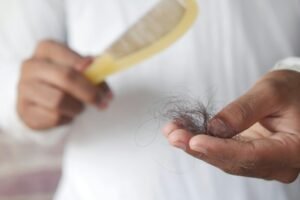Causes, Solutions, and When to See a Specialist Hair loss is not an uncommon phenomenon; it’s a problem affecting millions of people throughout the world. Unfortunately, shaving off one’s head can prove pretty debilitating to the self-esteem and general confidence of any individual. Taking charge of your life by comprehending the causes and assessing the solutions for hair loss, and knowing when you should consult an expert, can better help you in dealing with the disorder and empowering you to take action.
Understanding Hair Loss
Hair can fall for reasons varying from normal lifestyle to adverse diseased conditions. It is quite normal for every individual to lose approximately 50–100 hairs per day, considering the natural cycle of hair growth. However, excessive shedding, or an asymmetrical appearance of thinness, might be indicative of something going wrong that needs to be looked after.
Common Causes of Hair Loss
Genetics (Hereditary Hair Loss):
Androgenetic alopecia is the most common cause of hair loss, often known as male-pattern or female-pattern baldness. This genetic condition tends to produce a gradual thinning at the crown or a receding hairline.
Hormonal Changes:
Changes in hormones, especially in women, can also be another cause of hair loss. Events such as pregnancy, child delivery, menopause, or even for some specific hormonal imbalance, like thyroid problems, may cause temporary shedding.
Stress and Emotional well-being:
Telogen effluvium is a form of hair loss caused by physical or emotional stress. Stress results in an increase in the percentage of hairs that enter a resting phase, and a few months later into shedding. Often temporary, chronic stress can have a prolonged effect.
Diet and Nutrition:
A diet lacking in nutrients such as iron, vitamin D, zinc, and protein can impact hair structure, weakening it and causing a reduction in hair growth. Severe dieting and even eating disorders may provoke unmistakable hair thinning.
Medical Conditions and Treatments:
The autoimmune diseases like alopecia areata, scalp infection, and other chronic diseases may favor hair loss. Drugs, especially chemotherapy drugs, some antidepressants, and blood thinners, can lead to hair loss.
Hair Styling Habits:
Excessive heat styling, chemical treatment, putting tight hairstyles-like ponytails and braids-and using harsh hair products are all forms of hair stressors that can cause traction alopecia.
Solutions and Treatments to Hair Loss
Not all kinds of hair loss are permanent, but there are treatments and solutions to slow it down, completely stop it, and at best, reverse the process.
Lifestyle Changes:
Stress management through techniques for relaxation, regular exercise, and proper sleeping can aid in maintaining healthy hair. A proper intake of a balanced diet rich in vitamins and minerals will aid in its growth and strength.
Medication:
Only two FDA-approved treatments exist, namely, minoxidil or Rogaine and finasteride or Propecia. The former is an over-the-counter lotion, while the latter is an oral prescription medication taken only by men. Both medications are effective but do not produce results overnight, taking up to several months to become effective.
Topical and Nutritional Supplements:
It helps, especially topical treatments, serums, and supplements containing biotin, iron, and vitamin D. Yet, it is necessary to consult with a healthcare professional to corroborate which supplements will work and are safe to use.
Hair Restoration Procedures:
If one has severe or permanent hair loss, hair transplantation and scalp micro-pigmentation can be an option. Most of these procedures are highly expensive but very natural and long-lasting.
Laser caps and combs emit the very low energy of light and stimulate hair follicles, enhancing its growth. The effectiveness will vary, but LLLT works for some people.
When to Seek Professional Advice
Excessive, ongoing hair loss or sudden bald spots show the necessity of consulting a dermatologist or trichologist-the specialist in scalp and hair. If you notice any of the following signs, it may be time to see professional advice:
Sudden, unexplained hair loss or patchy baldness
Hair loss, especially if accompanied by itching, pain, or redness on the scalp
Hair shedding persists or does not noticeably improve with a change in lifestyle or over-the-counter measures.
Emotionally crippling hair loss or is destructive to one’s self-esteem.
The causes of hair loss may be detected through consultations with experts based on scalp examinations, blood work, or even a biopsy. This might prove helpful in leading a successful road to treatment due to the unique circumstances surrounding it.
Frequently Asked Questions
Commonly Asked Hair Loss Questions
Q:1- Is hair loss always permanent?
No, hair loss may be temporary or permanent; it depends on the cause of the problem. Hair loss due to stress, pregnancy, or change of diet is often temporary and should improve once modifications are made. Some cases, like genetic or scarring types of alopecia, could be permanent.
Q:2- How long does it take to see improvement in hair loss with treatments?
Success with treatments like minoxidil, change of diet, and supplements usually takes 3–6 months. Their success is based on one’s persistence and may vary from person to person.
Q:3- Will changing my diet help in hair growth?
Yes, a well-balanced diet with adequate iron, vitamin D, protein, and other nutrients will keep your hair healthy. If you suspect that you have one of these deficiencies, then consult with your health care professional about the best dietary modifications.
Q:4-Will hats cause hair to fall out?
No, wearing hats does not cause hair loss. Too-tight hairstyles and rough handling of your hair may cause breakage of your hair and lead eventually to thinning of hair.
Q:5-Do the natural remedies really work for hair loss?
Natural therapies such as scalp massage, essential oils-rosemary or peppermint-and a good diet may keep the hair healthy. Their effectiveness might vary and may be good if used in combination with other treatments.
Q:6- Does hair grow back after chemotherapy?
Hair that is lost due to chemotherapy usually grows back, although it may feel or even appear a little different at first. It starts to grow back in a few weeks after treatment, though it may take several months before much hair growth becomes apparent.
Hair loss can be a complicated thing to deal with; however, understanding the root of the problem and finding appropriate treatment does lots of difference. However, hair loss that either remains or aggravates calls for the professional’s help, who will guide and reassure you in your quest to get back to healthier, fuller hair.
Conclusion
Hair loss can be a very painful and tedious process, but it is one situation so many people find themselves in. Knowing the root causes, finding solutions that do work, and knowing where to seek help-in that light, you will take back your hair health with confidence. Let’s reiterate here: hair care is not one-size-fits-all; it takes time, it requires patience, and sometimes requires trial-and-error processes with or without the guidance of a specialist. Embracing a healthy lifestyle, managing stress, and taking good care of your hair will all help in making your hair stronger and healthier. And most importantly, while hair forms part of personal identity, true confidence and beauty come from inside-out.




